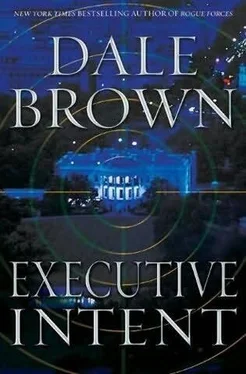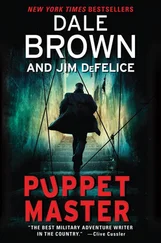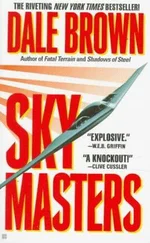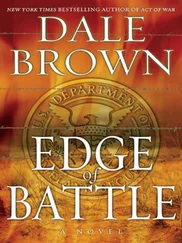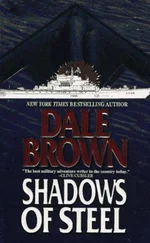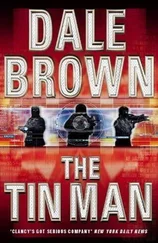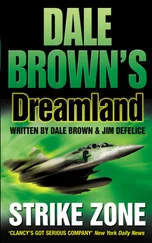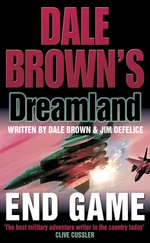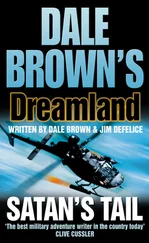“And the astronauts?”
“They’ll be evacuated later on today, sir,” Kai said. “Mr. Noble is in good shape-dehydrated, possibly a broken shoulder, some sunburn on his face, but otherwise well. We’re concerned about radiation exposure-he wasn’t wearing a full space suit-but so far he seems to have weathered that okay.”
“He wasn’t wearing a space suit? How could he survive in space without one?”
“Mr. Noble was wearing what we call an ‘activity suit’-an electronically controlled mechanical pressure suit that allows the wearer a lot more flexibility and freedom, but it doesn’t offer as much radiation protection.”
“It sounds like he’s a very lucky man,” Phoenix observed. “And the other astronaut? His family’s been notified?”
“Yes, sir, his parents and siblings-Lieutenant McCallum was unmarried. Recently graduated top of his class from Stanford. The engineering college there wants to have a public service for him, and the family has accepted.”
“I’d like to be there.”
“I’ll set it up with your office, sir.”
“Thank you. How long was Mr. Noble adrift in space?”
“A total of four and a half hours,” Kai replied. “When the spaceplane caught up with him, he was napping. Scared the hell out of us-we thought he had a concussion.”
“Amazing,” the vice president breathed. “Alone in orbit around Earth, and the guy slept through it. I’d like reports on your investigation as you have them, General.”
“We’ll keep them coming, sir.”
“Thank you.” The vice president spread his hands to the others in the Situation Room. “Okay, back to China and what they’ve got planned in Somalia. It’s got to be more than just a punitive strike against warlords who ordered the pirate attacks, as they claim. I think China has much more in mind. They don’t drop a few thousand troops on the ground just to drop-kick some pirates.”
“The secretary of state is in Beijing right now and is set to meet with the premier and the minister of foreign affairs shortly and will-”
“Secretary Barbeau has been in China so many times in the past few months, we should probably get her a nice apartment across from Tiananmen Square,” Phoenix said. He rubbed his temples again. “And it seems every time she’s sent to Beijing, the Chinese make another move that makes me wonder even more what they have in mind.”
“Diplomacy takes time, Mr. Vice President,” Kordus said without turning toward him. “Do you have any doubts that Secretary Barbeau is doing all she can to find out more about China ’s plans?”
“What I’m saying, Walter, is that we shouldn’t be waiting around for China to state its intentions before we voice our own,” Phoenix said. “We as the president’s senior advisers should draft a statement for the president, recommending he strongly condemn Beijing ’s actions, demand a halt to the bombings and shellings and an immediate withdrawal from the area except for forces involved in the joint antipiracy task force.”
“I don’t think that’s warranted at this time, Mr. Vice President,” David C. Keeley, deputy secretary of state, representing the Department of State while Secretary Barbeau was traveling. “The Somali pirates have been terrorizing the Horn of Africa for years now, and the international community has done very little proactively to stop them. China finally does something about the problem. Why do we want to lash out at China? They did the dirty work everybody else wanted done.”
“Because there’s a clear pattern of aggressiveness that’s very troubling, Mr. Keeley,” Phoenix said. “ China places antiship and antisatellite weapons all around the world. Our response: announce we will unilaterally decommission our antisatellite weapons, and call on the rest of the world to do likewise. Then, when China runs out of friendly nations to place a missile site, they decide to invade an unfriendly one. Who’s next-the Philippines, Taiwan, Thailand, Cuba? And what will our response be?”
“The president’s statement this evening reflects his views and those of the National Security Council: The United States is very concerned about China ’s actions, and we call upon Beijing to do more to minimize civilian casualties,” Kordus said. “You contributed to drafting that statement, sir.”
“As an initial reaction to events of which we had very little concrete information, the statement was acceptable to me, Walter,” Phoenix said. “That was eight hours ago, before China started bringing planeloads of troops and supplies into Mogadishu and started bedding down what looks to me like an occupation force. I’m saying we need a stronger statement. We should-”
“Do what, Ken?” President Joseph Gardner asked. He had silently appeared in the doorway of the Situation Room, completely unannounced. Everyone in the room stood; the president ignored them, instead fixing his gaze on his vice president. “What is it you want me to say to Beijing now?”
Phoenix paused for a few heartbeats. He glanced at Kordus, realizing now that the president’s chief of staff had called the president and warned him that his vice president was taking control of the meeting; then turned squarely back to the president and replied, “Sir, I think we should tell Premier Zhou that the invasion is a violation of the rights of a sovereign nation; the United States condemns China’s unilateral, surprise, and horribly violent attacks against innocent Somalis; that we demand that Zhou orders an immediate cease-fire and removes all ground forces offshore to their own vessels; and that all naval forces return to antipiracy-task-force operations under United Nations and NATO supervision.”
“And if they refuse?” the president asked.
“Then the United States will file a protest with the United Nations and ask for an emergency meeting of the Security Council to issue a resolution condemning Chinese activities in Somalia and ordering an immediate withdrawal.”
“ China will certainly veto such a resolution. What then?”
“We will then ask that the full membership issue a statement condemning Chinese actions and demand an immediate withdrawal.”
“ China can still refuse, or simply ignore the order. What then?”
“The United States removes China from the antipiracy Combined Task Force and notifies the world that any PRC warships en route to or from Somalia will be considered hostile combatants en route to an illegal combat zone,” Phoenix said. “This action prohibits Chinese warships or support vessels from utilizing certain ports that are also in use by the United States or its allies. If any nations continue to support Chinese warships, we place sanctions on those countries. This will stretch out China ’s supply lines and make it more difficult if not impossible to support blue-water naval operations. We then make it clear to Beijing that even tougher sanctions will follow if they don’t comply.”
The president nodded, looked Phoenix up and down as if meeting him for the first time, then nodded again. “You’ve given this quite a bit of thought, I see,” he said in a quiet voice. Phoenix had no response. “So you want to play hardball with China, Mr. Phoenix, is that right?”
“I want to make it clear that we don’t like any country bombing another country and killing innocent civilians in an area of the world under active patrol by the United States and its allies,” Phoenix said. “I want them to understand that we’ll act if our wishes are not met.”
“And you don’t think I’ve been clear, Mr. Phoenix?”
The vice president hesitated just for a moment-now it was getting personal. But then he replied, “In my opinion, sir, I think your last public statement regarding China was ambiguous.”
Читать дальше
